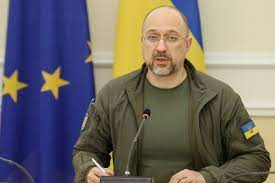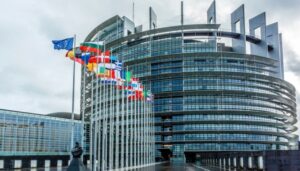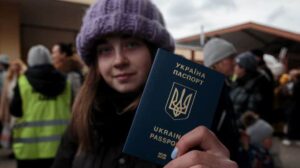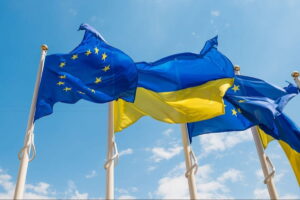
Ukraine is ready to extend the transit of Russian gas through its gas transportation system (GTS) at the initiative of the European Union countries, but will not extend the current contract or sign a new one with Gazprom, Prime Minister Denis Shmygal said at a press conference in Kiev on Monday.
“We are certainly not going to negotiate with the aggressor country to extend (the transit contract) and put our signatures under the agreement, but we have had repeated talks with European leaders on the basis of the European Commission. If European countries will act as a consortium or one of the European partners will act as a transit company for its own gas, we are ready to provide such a service. Here the initiative is on the side of the EU and our European partners,” he said.
“Group, association, consortium… It could be the EC, a group of European countries that are interested in preserving transit,” Shmygal specified.
At the same time, according to the Prime Minister, the GTS of Ukraine is ready to function without the transit of Russian natural gas.
As reported, the transit of Russian natural gas through the gas transportation system (GTS) of Ukraine in 2023 decreased by 28.4% (by 5 billion 812.6 million cubic meters) compared to 2022 – to 14 billion 646.6 million cubic meters.
The contract between Naftohaz Ukrainy and Gazprom for the organization of transportation, the transportation agreement between NAK and OGTSU, as well as the inter-operator agreement between OGTSU and Gazprom were signed on December 30, 2019. The contract provides for transit of 40 billion cubic meters of gas per year in 2021-2024.

Ukraine has received 1.5 billion euros of macro-financial aid from the European Union, Prime Minister Denis Shmygal said.
“Thus, the total budgetary support from the European Union this year reached 18 billion euros. These funds help us to maintain economic sustainability and fulfill social obligations,” Shmygal wrote in his Telegram channel.
He also thanked the EU for the weighty and timely assistance to Ukraine and expressed hope for further support.

The Verkhovna Rada has appealed to the European Union member states and EU institutions to support the opening of negotiations on Ukraine’s accession to the European Union. The relevant resolution No. 10315 was voted for by 292 MPs at the plenary session of the Verkhovna Rada on Saturday, said Oleksiy Honcharenko, a member of the European Solidarity faction.
“The Verkhovna Rada appeals to the national parliaments and governments of the European Union member states, the EU institutions and calls… to support Ukraine’s aspirations to join the European Union by adopting a decision to open negotiations on Ukraine’s membership in the European Union during the European Council meeting on December 15, 2023,” the text of the appeal reads.
The MPs also called on EU members to increase military assistance to Ukraine both at the national level and within the framework of the European Peace Fund.

The European Union has approved the decision to extend temporary protection for refugees from Ukraine until March 4, 2025, the European Commission said.
“On September 27, 2023, ministers reached a political agreement to extend temporary protection for Ukrainian nationals until March 4, 2025. The decision was taken on October 19, 2023,” the European Commission said in a statement on its official website on Thursday.
The EU activated the Temporary Protection Directive on March 4, 2022. This is an EU mechanism that is activated in exceptional circumstances of mass influx to provide collective protection to displaced persons and reduce pressure on the national asylum systems of EU countries.
According to the EC, a total of 4.1 million refugees from Ukraine are registered for temporary protection or similar schemes in the EU.

European Union countries increased beer production by 7% in 2022, almost to 34.3 billion liters, the EU statistics office said.
The bottling volume thus approached the pre-pandemic 2019 figure of 34.7 billion liters.
The production of beer with an alcohol content of less than 0.5% (non-alcoholic beer) remained unchanged at 1.6 billion liters.
Total beer output per capita amounted to about 80 liters last year, the report said.
Germany remains the main producer. It accounted for more than 22% of the total volume, or 7.6 billion liters of beer containing alcohol. It is followed by Spain (3.9 billion liters, or more than 11%), Poland (3.7 billion liters, or 11%), and the Netherlands (2.6 billion liters, or almost 8%).
At the same time, the Netherlands continues to be the main exporter of beer, having shipped 2.6 billion liters outside the country, including EU states, in 2022 (up 0.7 billion liters from the previous year). This represents 27% of total EU export sales.
The second place was taken by Belgium (1.6 billion liters, 17%), the third – by Germany (1.5 billion liters, 16%). The Czech Republic (0.6 billion liters, 6%) and Ireland (0.4 billion liters, 5%) were also in the top five.
The main destinations for beer exports outside the EU were the UK (860 million liters, 21%) and the USA (716 million liters, 18%), as well as China (349 million liters, 9%), Russia (271 million liters, 7%), and Canada (155 million liters, 4%).
France remained the largest importer of beer in the European Union, purchasing 0.9 billion liters of beer from union members and other states, accounting for 17% of the total volume. Next came Italy (over 0.7 billion liters, or 14%), Germany (just under 0.7 billion liters, 12%), the Netherlands (0.6 billion liters, 11%) and Spain (0.5 billion liters, 10%).
Britain imported the most significant volumes of beer into the EU (excluding union members) – 290 million liters, or 57% of all shipments. It also imported 99 million liters of Mexican beer (19%), 40 million liters of Serbian beer (8%), 15 million liters of Ukrainian beer (3%) and 11 million liters of Chinese beer (2%).

Ukraine’s state budget on Tuesday received the sixth tranche of EUR1.5 billion as part of the EU’s large-scale macro-financial assistance for 2023, the Finance Ministry said.
The ministry specified that since the beginning of the year Ukraine has already received EUR10.5 billion of macro-financial aid from the EU out of the total funding of EUR18 billion.
“Since the beginning of the full-scale war, the EU has sent EUR17.7 billion of macro-financial assistance to Ukraine. These funds have contributed to maintaining macroeconomic stability in the country, as well as help finance priority state budget expenditures in a timely and full manner,” Ukrainian Finance Minister Serhiy Marchenko said in the release.
The Finance Ministry recalled that the funds are provided on unprecedentedly favorable terms for Ukraine and are used to finance priority state budget expenditures. In particular, the loan repayment period is 35 years, while interest and other debt service payments will be compensated by the EU countries instead of Ukraine if Ukraine meets the conditions under the program.
The next tranches under the large-scale macrofinancial assistance program will be received by the state budget during 2023, subject to Ukraine’s fulfillment of the conditions agreed upon by the parties, the Finance Ministry said.
As reported, as of July 21 this year, the state budget of Ukraine received funding from international partners in the amount of $23.6bn, compared to $32.1bn last year, while the need for this year is about $42bn.